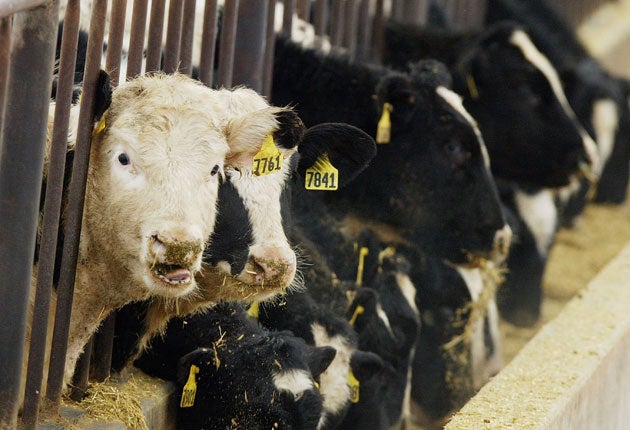Farmers may use animal by-products in feed again
The European Union is keen to reintroduce practices banned on farms since the 'mad cow' scandal broke

Controversial practices for the feeding of livestock not seen since the days before mad cow disease rocked the nation could be reintroduced after a change of heart in Brussels.
MEPs will vote this week on whether to lift the ban on feeding animal by-products to pigs, chickens and farmed fish. They have been urged to back the move by an influential EU committee, which called in a recent draft report for the feed ban to be revised.
The document, from the European Parliament's Committee on the Environment, Public Health and Food Safety, stops short of altering the status quo on cattle feed, pointing out that because cows are vegetarian they should not be fed so-called "processed animal proteins" (PAP). The same goes for sheep.
The potential U-turn comes as concerns escalate about how the world will continue to feed itself against a backdrop of rapidly inflating food prices and a soaring population. At the moment, animal feed producers import vast quantities of soya from countries in South America, grown on land that could otherwise be used to feed people living there. Demand for soya-based animal feed is also fuelling the destruction of the Amazon rainforest.
Although altering the composition of animal feed would make ecological sense, Britain's livestock industry fears that the move would prove commercial suicide. A debate at the annual Pig & Poultry Live event earlier this month revealed many farmers were horrified by the EU proposal. A vote by 400 farm business leaders revealed that two-thirds of delegates at the event thought PAP posed more of a problem to the industry than it would solve.
Kelly Watson, chief poultry adviser at the National Farmers' Union, said yesterday that although the science behind the rethink was sound, serving up animal feed made from animal by-products was "not something consumers or retailers are ready to accept". She added: "The poultry sector has a good name in terms of food safety and we wouldn't want anything to jeopardise that."
Philip Graves, an expert in predicting consumer behaviour, said the public would be unlikely to stomach the change. "From a consumer perspective, it's very easy to understand why there would be a potentially adverse reaction," he said. "Consumers have a simplistic and partially media- and supermarket-driven perspective about what agriculture and farming is about. They think chickens should just eat corn because they see corn-fed chickens for sale at supermarkets that are a nice colour. But the fact that chickens don't eat protein at the moment is a problem, and means they're not as strong as they should be. From the attitude of sustainability and animal welfare, there are some very strong arguments for introducing PAP into diets," Mr Graves added.
Rosemary Moon, a food writer and consultant to Waitrose, said: "Logic says it isn't right to feed animal waste products to animals, but many animals are carnivorous. We simply can't afford to go on wasting food, for humans or animals, in the way we do."
Despite the threat posed by the BSE scare, far fewer people have succumbed to Creutzfeldt-Jakob Disease – vCJD – than was initially feared. In the past two decades, 171 people have died, with a further four people still alive who have vCJD. Yet a report in The Lancet medical journal has warned that cases could still emerge until as late as 2056.
Join our commenting forum
Join thought-provoking conversations, follow other Independent readers and see their replies
Comments